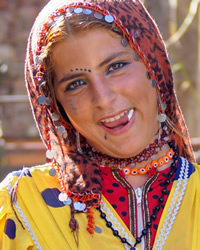Romani, Balkan in Romania

Photo Source:
CharlesFred - Flickr
Creative Commons
|
Send Joshua Project a map of this people group.
|
| People Name: | Romani, Balkan |
| Country: | Romania |
| 10/40 Window: | No |
| Population: | 19,000 |
| World Population: | 946,100 |
| Primary Language: | Romani, Balkan |
| Primary Religion: | Christianity |
| Christian Adherents: | 70.00 % |
| Evangelicals: | 4.00 % |
| Scripture: | Complete Bible |
| Ministry Resources: | Yes |
| Jesus Film: | Yes |
| Audio Recordings: | Yes |
| People Cluster: | Romani |
| Affinity Bloc: | Eurasian Peoples |
| Progress Level: |
|
Introduction / History
The Romani people are often misunderstood. They have been called “Gypsies” because people thought they were from Egypt. That term has become derogatory. Romani call themselves Rom, which in their language means "men." Rom is derived from the Indian word Dom, meaning "a man of low caste who gains his livelihood by singing and dancing." They could also be metal workers. In India, they were discriminated against and excluded from the temples. Later, they were sent to Persia as minstrels. From there, they were separated into two groups. One traveled northward and became the Romany-speaking European Romani. The other traveled southward and became known as the Domari or Middle Eastern Romani. Through time they developed numerous dialects.
As the name suggests, Balkan Romani speakers are mainly in the Balkan nations. This dialect uses grammar from the Turkish language. Like other Romani languages, it has some influences from Greek. There are smaller populations in different parts of Europe and even as far as Algeria. One of their countries is Germany. In that country, they are greatly outnumbered by the Sinte Romani.
People often assume that all Romani have dark hair, complexion, and eyes; however, Balkan Romani sometimes have lighter skin and even blond hair and blue eyes. This is probably because their ancestors mixed with Europeans. Unlike the Romani who have remained in India, many Balkan Romani are settled.
What Are Their Lives Like?
Commonly, Balkan Romani people in Romania are craftsmen, making goods out of copper, etc. Others have regular working-class jobs.
Romani have long been known for their abilities as musicians, singers and dancers. This is especially true in Romania where they have also let their mark as boxers and soccer players.
Romani marriages usually take place between couples in their early to mid-teens. This causes friction in Romania, where the government does not want child marriages.
What Are Their Beliefs?
Wherever they live, the Romani people adopt the local religion. In Romania, that means adhering to some form of Christianity. Beneath the surface of organized religion, they sometimes maintain their religious traditions and beliefs. Some believe that ghosts, lizards and snakes are capable of harming humans. People have the power to curse others by giving them the "evil eye." Others have come to true repentance in Christ, and they are following him.
What Are Their Needs?
Although they may be more sanitary, better educated, and have more opportunities than Romani in the Middle East and India, they all have one thing in common: the need for Jesus. Christ's followers can be Christ-bearers to these rejected people. It will take people who are willing to take risks for the Lord.
Prayer Points
Pray that Balkan Romani people will find love and acceptance through Christ, leading them to give him all their dedication.
Pray for a heartfelt dedication to Jesus Christ that will rise high above traditional beliefs.
Ask the Lord to raise up loving and dedicated people who are willing to share Christ with the Balkan Romani.
Pray that soon there will be a movement of Balkan Romani discipling others, spreading the fragrance of Christ far and wide.